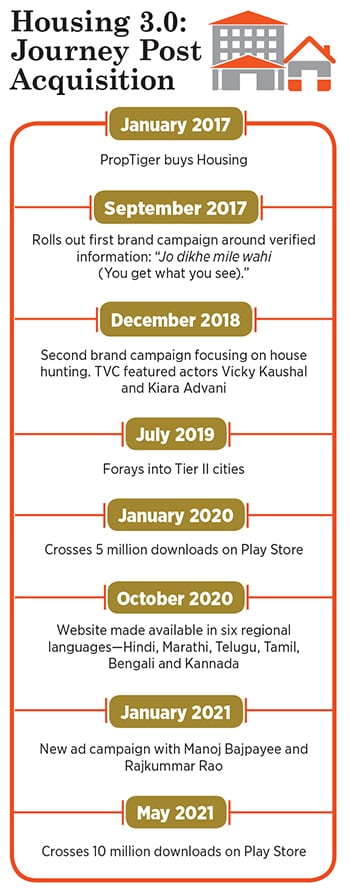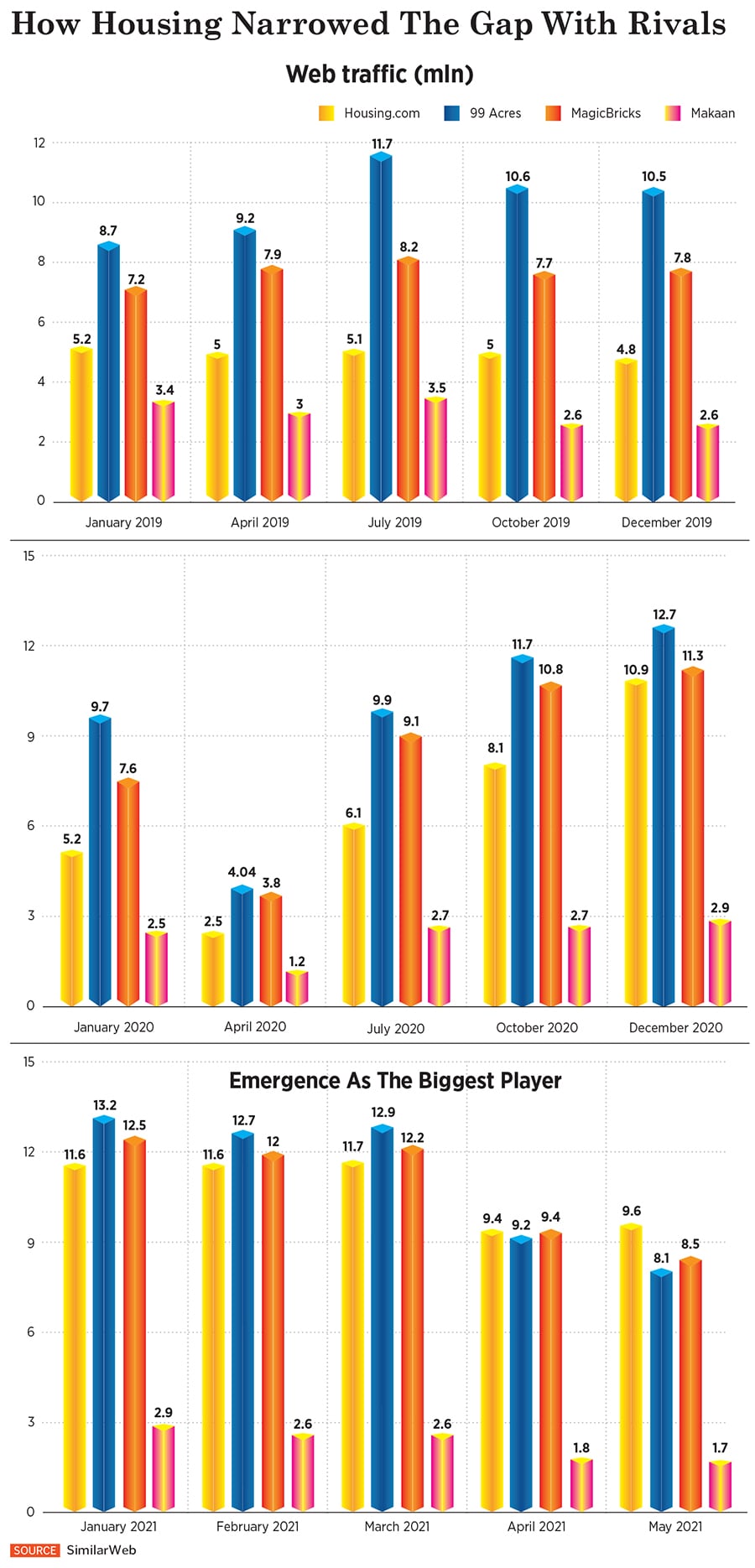The beginning was on a bizarre note as well. On one of the placid Sundays in October 2015, Agarwala got an unexpected call from Tokyo. ‘Please fly down immediately’ was the request from the one of SoftBank’s honchos. “We need to discuss Housing.com." Agarwala was not prepared. In fact, he was about to leave for the US along with his eldest daughter for her school interviews tour. “You can fly to the US via Japan," was the solution offered to end Agarwala’s dilemma.
The lunch meeting in Tokyo, which happened after a few days, ended on a positive note. SoftBank was exploring a buyer for its troubled online realty classified startup Housing, which was fast imploding due to a bitter public spat between one of its co-founders and investors. A month later, SoftBank officials paid a return visit to Elara’s headquarters in Gurugram. The pace of talks gathered momentum. In February 2016, Agarwala and his four-member team went to San Carlos in California to finalise the nitty gritty of the deal, which looked almost sealed.
Apart from the conclusion of the deal, Agarwala didn’t have much to cheer about. Reason: Housing’s precarious financial health. While revenue from operations inched from ₹5.46 crore in FY15 to ₹6.5 crore during the next fiscal, losses ballooned from ₹279 crore to ₹403 crore during the same period. Though Kothari managed to turn around the startup—revenue doubled to ₹13.2 crore and losses were cut by over 60 percent to ₹169 crore in FY17—it still didn’t look like a great asset. In fact, one of Elara’s investors got alarmed. “You are entering into a sinking ship. Be careful," he warned Agarwala.
Cut to June 2021. Agarwala’s gambit seems to have paid off.
In over four years of finding a new buyer, Housing has crossed ₹100 crore in revenue. It became the biggest online real estate classified player in terms of traffic when it clocked 9.6 million hits in May, followed by rivals MagicBricks and 99acres (see box).
Agarwala is elated. “It’s Housing 3.0 as we assume leadership in traffic," he says. Over the next 12 to 18 months, he proclaims, Housing will become the biggest in revenue as well. “That’s the goal now," he says. He explains the game plan to take pole position: Market by market. “We have shortlisted a couple of markets where we will beat these guys in sales," he explains. The flywheel then will gather pace. Though clocking ₹100 crore is exciting, what’s most satisfying for him is the fact that Housing has become the flagship brand of Elara Technologies, which is owned by Australia’s REA Group, in which Rupert Murdoch’s News Corp has a majority stake. “Housing is also our biggest revenue earner," he says.
![]() Agarwala is not alone to rejoice. One of Housing’s co-founders is equally ecstatic. “The birth of Housing is very close to my heart," says Advitiya Sharma, co-founder and former chief marketing officer of Housing. Though mergers, he lets on, usually end up being black holes for startups, Housing is one of the few startups to grow successfully even after the merger. “It’s a great example of a great merger," he says. There is a tinge of regret, though, in his voice. He explains. “Had we not spread ourselves too thin, we had the golden opportunity to become the fastest unicorn," he rues. When Housing was started in 2012, he recounts, it disrupted the market which was full of fake listings and information. “We always believed that if we successfully build a brand, we will build a brilliant business," he says.
Agarwala is not alone to rejoice. One of Housing’s co-founders is equally ecstatic. “The birth of Housing is very close to my heart," says Advitiya Sharma, co-founder and former chief marketing officer of Housing. Though mergers, he lets on, usually end up being black holes for startups, Housing is one of the few startups to grow successfully even after the merger. “It’s a great example of a great merger," he says. There is a tinge of regret, though, in his voice. He explains. “Had we not spread ourselves too thin, we had the golden opportunity to become the fastest unicorn," he rues. When Housing was started in 2012, he recounts, it disrupted the market which was full of fake listings and information. “We always believed that if we successfully build a brand, we will build a brilliant business," he says.
Back in August 2015, a month after Housing sacked controversial co-founder and enfant terrible of startups Rahul Yadav, citing ‘objectionable behaviour’, Jason Kothari was made the head of Mission Impossible: Salvaging whatever was left of Housing. The startup had three months of runway left there was no trust from its existing investors, much less from new investors, to raise further capital and there was no strategy and business model.
Kothari, who was appointed as chief business officer of Housing by SoftBank in August 2015, was not convinced about his role. Reason: Lack of experience in online real estate. The leadership at SoftBank, though, felt that Kothari was the right person for the job. His track record in turning around his company, Valiant Entertainment, added heft to his reputation. In the driving seat at Housing, the young entrepreneur decided to look at the silver lining. “Housing had a great product, a young and talented team, and was in a large, unorganised space ripe for disruption," he recalls. Rather than focusing on what went wrong, Kothari started to rebuild the startup, which marked the beginning of Housing 2.0.
The immediate task was to reboot the startup. Kothari hired a new management team—CXOs from Google and Reliance Jio focussed on the most important vertical of buying and selling homes, and devoted all his energies on the top seven cities in India. He restructured the operations to optimise efficiencies, including reimagining the organisation chart of the 1,000-people team, their KRAs (key result areas) and KPIs (key performance indicators), and culture. Steps were taken to rebuild trust with investors and more capital was raised.
![]()
The results were for all to see. Revenue from operations leapfrogged, cost was cut by 80 percent, and traffic went up by over 200 percent. “The number of homes listed went up by over 400 percent, making our platform the most popular for buyers and sellers," he recalls. Though a lot of investors were still hesitant to work with Housing due to its tarnished reputation, strong results of Housing 2.0 sent a clear message that the startup is making heady progress to get back on the track. What this also meant was that the mission of selling Housing was looking quite possible.
Though almost every organised real estate player was in the fray to buy Housing, what tilted the scales in favour of PropTiger was its long-term vision. “The best partner is not necessarily the one that makes the highest offer because we are not cashing out," claims Kothari. Having a similar vision, complementary capabilities, compatible culture and a long-term view in building the business was something that Kothari was looking for in the potential suitor. “From this lens, it was clear that News Corp and its portfolio company PropTiger were the best partners for us," he says. What also helped was developing a friendly bond with Agarwala. “Our relationship ended up being critical in clinching the complex deal when all other parties involved had given up," he recalls. The merged company of Housing and PropTiger was valued at approximately $350 million, which made it the most valuable company in the space then having a strong online and offline capabilities. “It’s not a surprise that the company has fully realised the vision of becoming the clear market leader," he adds.
Back in January 2017, when Housing was bought by PropTiger, Agarwala didn’t have even a wild idea of making Housing the leader. In fact, till December 2016, Makaan was bigger than Housing. Then something spectacular happened. In the last three months of FY17—January, February and March—Housing clocked more sales than Makaan. “This was when the penny dropped for us," he recalls. “It convinced us about the potential of the brand." The CEO took a slew of steps to revitalise Housing. First, almost a year was spent in bringing about integration. The headquarters was shifted from Mumbai to Gurugram roles and portfolios were streamlined and a new team was built. Second, Agarwala started amplifying the brand equity by periodically rolling out campaigns on television, social media and out of home. Third, the brand was aggressively expanded to widen its reach and appeal.
Housing as a brand, reckon marketing and branding experts, is what gave it a new lease of life. “Though the co-founders of Housing couldn’t build a business, they built a brand," says Harish Bijoor, who runs an eponymous brand consulting firm. The scramble among suitors to buy a burning house, he adds, was not because of its great business proposition. “All wanted to have the brand," he says. If one invests and nurtures a brand, it always pays back. “In Housing’s case, the guys who reaped the rewards were the new owners," he says.
Though the turnaround has been rewarding, Housing has some challenges to contend with. First is the fact that the startup is still not profitable. Agarwala is not bothered. “We are still investing significantly on brand, product, technology, and the focus is on growing market share over the next few years," he says. Though having a deep-pocketed investor like Rupert Murdoch helps during crises such as the pandemic, prolonged subdued sentiments in the real estate market might pinch in the long run. Agarwala reckons that real estate industry might be at the cusp of an upturn. The market, he points out, had a terrible run since 2013. Though there were signs of revival in 2016, demonetisation snuffed all hopes. Then came GST, the NBFC crisis and the pandemic. “Between 2013 and 2021, it has been an eight-year down cycle in real estate," he laments.
What’s encouraging, though, is the bounce back during February and March this year. “Those were record months for Housing and PropTiger," he says, adding that in the subsequent two months of April and May, the business got hit. Once the second wave fades and cyclical upturn clicks in real estate, he explains, the business will revive again. “Covid has made people realise the importance of owing homes, and bigger ones," he beams. Housing, he asserts, will become the biggest player in India even in terms of revenue over the next 12 to 18 months. His optimism stems from the fact that Housing managed to get the largest traffic in May. “For any internet brand, the first thing that needs to go up before revenues catch up is traffic," he says. “The house is in order, and Housing too will top the pecking order."

 Then came the disappointing news in March. Agarwala didn’t lose heart. He kept the plate warm with Jason Kothari, who was roped in by SoftBank in August 2015 to save the sinking ship. Nothing happened over the next few months. SoftBank was still scouting for suitors.Then out of blue, Agarwala sent an unsolicited, non-binding offer in June 2016. The terms this time were more amenable to the Elara backers. A day later, he got a call from SoftBank. “It lasted for 20 minutes. They made a counter-offer," recalls Agarwala. Soon, Elara, its backers, SoftBank and other investors in Housing agreed. The deal was on, though it took seven months to close it in January 2017. “Housing was not part of the family," says a beaming Agarwala.
Then came the disappointing news in March. Agarwala didn’t lose heart. He kept the plate warm with Jason Kothari, who was roped in by SoftBank in August 2015 to save the sinking ship. Nothing happened over the next few months. SoftBank was still scouting for suitors.Then out of blue, Agarwala sent an unsolicited, non-binding offer in June 2016. The terms this time were more amenable to the Elara backers. A day later, he got a call from SoftBank. “It lasted for 20 minutes. They made a counter-offer," recalls Agarwala. Soon, Elara, its backers, SoftBank and other investors in Housing agreed. The deal was on, though it took seven months to close it in January 2017. “Housing was not part of the family," says a beaming Agarwala. Agarwala is not alone to rejoice. One of Housing’s co-founders is equally ecstatic. “The birth of Housing is very close to my heart," says Advitiya Sharma, co-founder and former chief marketing officer of Housing. Though mergers, he lets on, usually end up being black holes for startups, Housing is one of the few startups to grow successfully even after the merger. “It’s a great example of a great merger," he says. There is a tinge of regret, though, in his voice. He explains. “Had we not spread ourselves too thin, we had the golden opportunity to become the fastest unicorn," he rues. When Housing was started in 2012, he recounts, it disrupted the market which was full of fake listings and information. “We always believed that if we successfully build a brand, we will build a brilliant business," he says.
Agarwala is not alone to rejoice. One of Housing’s co-founders is equally ecstatic. “The birth of Housing is very close to my heart," says Advitiya Sharma, co-founder and former chief marketing officer of Housing. Though mergers, he lets on, usually end up being black holes for startups, Housing is one of the few startups to grow successfully even after the merger. “It’s a great example of a great merger," he says. There is a tinge of regret, though, in his voice. He explains. “Had we not spread ourselves too thin, we had the golden opportunity to become the fastest unicorn," he rues. When Housing was started in 2012, he recounts, it disrupted the market which was full of fake listings and information. “We always believed that if we successfully build a brand, we will build a brilliant business," he says.